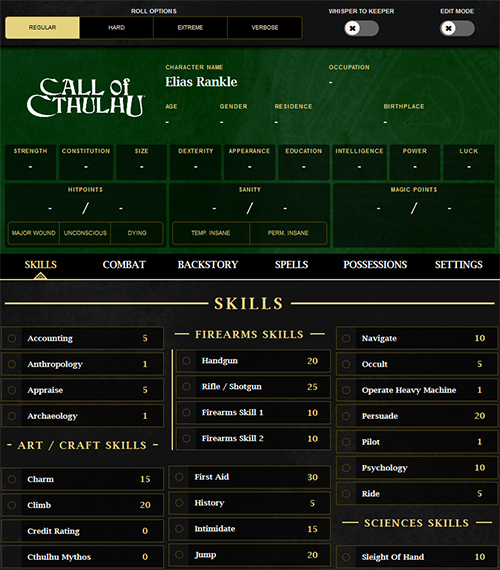
/pic2611195.jpg)
One can gain, but usually just loses points form the original Max Value in each of these. Each of these is initially derived form the Characteristics rolled, but each of them is fluid and separate from the characteristics once play begins.

Cthulhu knowledge is bad for a character to have because it eats away at their sanity, so no one truely wants to have a large amount of knowledge in that area.Īlso, I'd point out the Hit Points, Sanity, Luck, and Magic Points. Credit Raiting is used as money for the most part so that may be why, but I'm not sure. I haven't read the rules on Credit Rating yet so I don't know why it doesn't have one.

Note: The Credit Rating and Cthulhu Knowledge skill don't have a check box for advancement. For example, our game is set in the 1920s and does not need a Computers skill, but a modern setting might and it isn't a base skill on the official character sheet. So I guess, now that I have talked though all of that, my suggestion is to start with all the listed skills and their base chance percentage on the sheet but allow the addition of more skills to the sheet if needed. Additionally if you coded the small boxes to somehow do the math for one-half and one-fifth that would help as well. It would speed up the use of a character sheet if the Base Chance Percentage where automatically filled in for a player and then they could fill in a the box to the right if need be. But every character has the potential to be use a skill successfully, so there is a base chance for all skills. Anyone can pick up a gun and use it (assuming it has been loaded by someone with the proper knowledge and the safety is off, etc.) but patching up a wound is something not everyone may be able to do successfully. So this skill has a higher base chance of success than say, Medicine needed to repair a bullet wound. At a short distance, under the right circumstances there a bullet will hit its target. This is meant to illustrate the "point and click" nature of firearms. For example Firearm(Pistol) comes with a 20% base rank. Then there is the Base Chance Percentage for every skill. If there is some skill that might be relevant to a player and/or Narrator it can be penciled in. The blank lines that appear under Track are the final catch all. Languages and Science also have sub categories that might be needed as you can see. The blanks under Fighting(Brawl) leave space for specific martial arts, and under Firearms(Rifle/Shotgun) there is a slot for additional types of weapons like Archery or Machine Gun (again, depending on if the Narrator wants to make those distinctions). Because a character is good at welding, or pottery may not mean they are good at painting or drawing. These are skills that have sub categories or specializations that a player might need to note depending on the Narrator's preference. Note that certain skills have blank lines underneath them.

The issue with skills being exhaustive.the short answer is no, the skills that appear on the 7e sheet are not the entire list. So it would be helpful to see those two values. I don't know the exact wording on that at the moment, so I won't get to deep into it but if you roll under the one-fifth value in certain circumstances, one achieves a bonus, like a critical success in other games (but also a little different). When a task is harder the Narrator can impose penalties and quickly referencing those numbers can speed up the game.Īlso, knowing the One-fifth value comes in handy for the Impale Rule. The two small boxes to the right are for noting the half and one-fifth values. This next bit applies to both Stats and Skills. So a checkbox on those would be helpful for tracking purposes. When the Narrator decides it is time to advance, each skill that is checked off gets a chance to advance. This comes into play during character advancement. The check box to the left is for marking that the skill has been used successfully. I'll start by answering the check box question.
#Call of cthulhu 7e character sheet pdf#


 0 kommentar(er)
0 kommentar(er)
